How Do Pressure Washers Work? What Are They Good For?
-
Kristin Hitchcock
- Last updated:
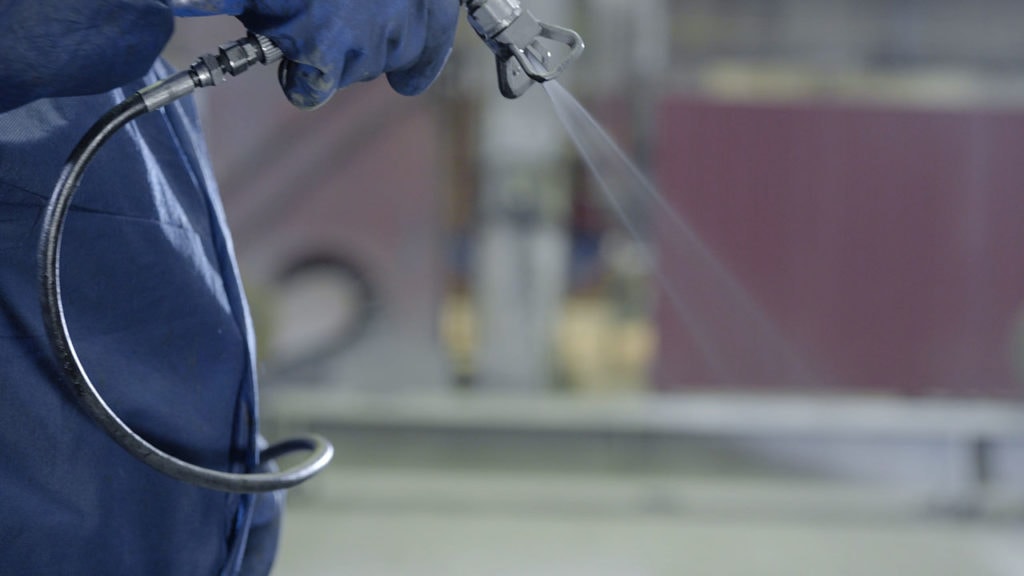
Pressure washers are often an accepted part of home maintenance. If you want to keep your siding clean, one of the easiest ways is to pressure wash it. You can either purchase a pressure washer yourself (as they are very helpful for many cleaning tasks) or hire a professional to do the cleaning. While using a pressure washer isn’t hard, hiring a professional can be helpful when dealing with sensitive materials.
While many homeowners regularly wash (or hire a professional to wash) their homes, how pressure washers work is less known. These machines aren’t complicated and operate under a very straightforward method.
 How Does It Work?
How Does It Work?
Pressure washers function pretty simply. There is a bottle or container that holds detergent. Often, these are commercially made for pressure washers. However, you can make your own solution, too. A hose connected to this container draws this cleaning solution up.
There is also a connector for a hose. This hose draws in water that is filtered as it enters the machine. Therefore, this water is “extra clean.” It removes any potential impurities.
All of this is powered by a motor or engine of some sort. There are many kinds of pressure washers that range from diesel to electric, so there are many ways they can be powered.
Water is pumped from both the hose and detergent. Somewhere in the machine, these two pathways meet, and the water and detergent mix. Some pressure washers also heat the water at this point, which can help make cleaning easier. Either way, the machine takes the detergent and water and prepares them to clean your home.
Then, the solution-water mixture comes out of the pump at the end of the exit hose. This nozzle has a narrow end that increases the water’s pressure. The machine pushes the water through very quickly, creating a lot of pressure. Of course, this water jet cleans very effectively. However, it is also more efficient than your average hose since it sprays less water at a time.
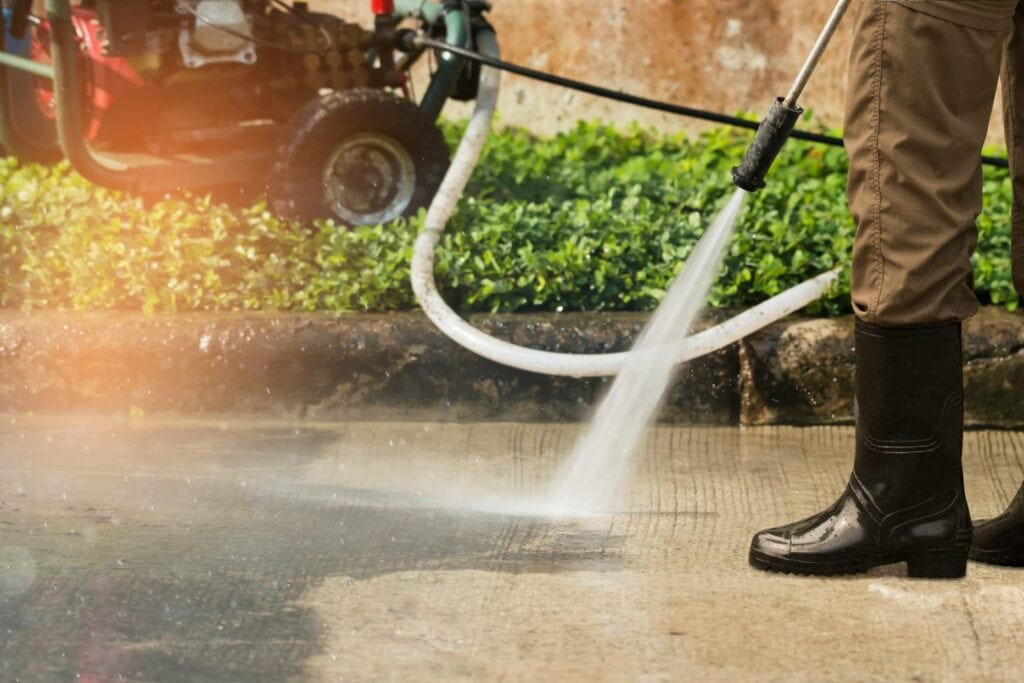
What Are the Different Types of Pressure Washers?
There are two main types of pressure washers: electric and gas. Gas options used to be the clear winner, but now things are a bit more complicated. Batteries have improved, so electric models are now more competitive. However, they tend to be more expensive because of their battery. Gas models are cheaper, but you’ll have to deal with mixing gas.
Most heavy-duty professional pressure washers are diesel. It’s still easier to produce more energy with gas than electricity, which is why high-powdered machines require gas. However, you can find some decent homeowner-level options that are electric.
Ultimately, it matters more about the particular model than what it is powered by. However, you should still consider this an important part of choosing a pressure washer.
Advantages of a Pressure Washer
Pressure washers can be very helpful in keeping your home looking great. Plus, they also have several other benefits. There is a reason they are so popular, after all.
1. No Scrubbing Required
With a pressure washer, you can easily remove layers of grime without scrubbing. Not only does this save your arm, but it also saves much time. Therefore, hiring a professional to clean your home with a pressure washer is cheaper than the alternatives.
2. Straightforward
Using a pressure washer is pretty straightforward. Add detergent to the machine, attach a hose, and point the nozzle. Of course, using one well can be a bit more complicated. For instance, you’ll need to ensure that you don’t damage the material you’re cleaning. You’ll also have to consider the detergent you’re using and properly mix the gas for a gas-powered washer. However, overall, the process is pretty easy.
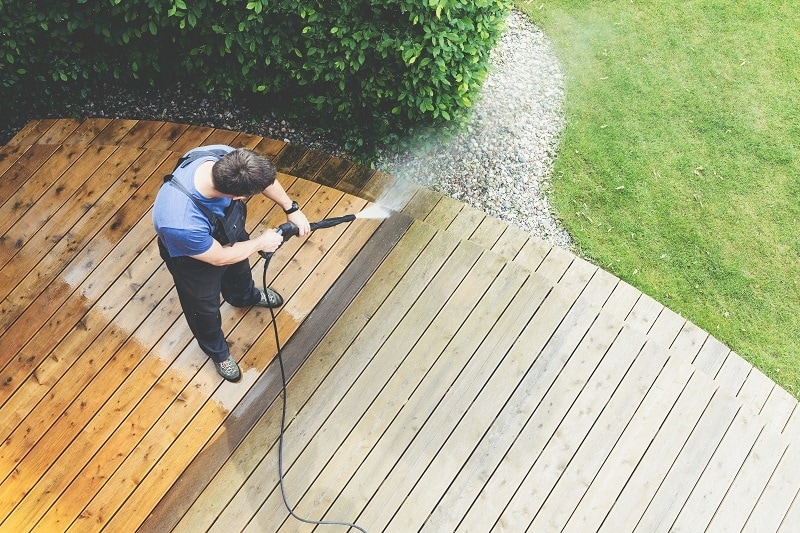
3. Cleans very well
Many people like pressure washers because they clean very effectively. One of these pressure washers can easily remove years of grime and dirt from your home. Plus, they can even remove hard water stains and mold. Therefore, you can purchase a pressure washer and be assured that it will work.
4. Improved Curb Appeal
A clean home easily looks better than one that isn’t clean. If you want to add curb appeal, pressure washing the house may be exactly what you’re looking for. It’s inexpensive, but it can be extremely effective at increasing the aesthetics of your home. You can also use a pressure washer to improve the conditions of your sidewalk and driveway—something that can’t be done easily otherwise.
5. Environmentally Friendly
Pressure washing is pretty easy on the environment compared to alternative methods. It’s very water efficient, as the hose releases very little water at once. It doesn’t use harsh chemicals, instead relying on the pressure of the water. You don’t have to worry about using a bunch of water or adding potentially harmful chemicals into the environment.
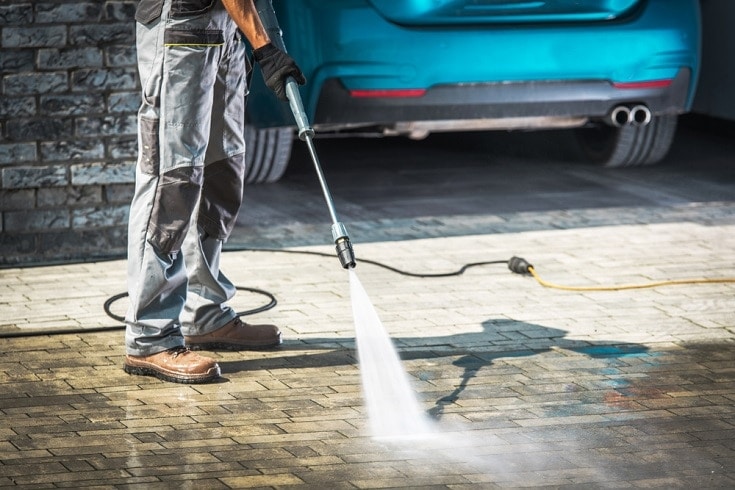
 Disadvantages of Pressure Washers
Disadvantages of Pressure Washers
There are some disadvantages of pressure washers, too. These machines aren’t perfect. It’s important to consider the pros and cons before using one on your home.
1. Noisy
These machines can make a lot of noise, depending on the model. Sometimes, this may lead to irritated neighbors. Be sure to check with your local restrictions, as well, as you may not be able to use these machines during certain times. Some models are quoted as being “quieter,” but even these can be pretty loud.
2. The dirt gets blasted everywhere
Sure, these machines blast the dirt and grime off of the wall. However, this grime tends to shoot off in many directions, including all over you. Sometimes, this can be dangerous, as in the case of mold. Therefore, you must wear the proper protective equipment and consider your clothes. Don’t wear anything you particularly care about.
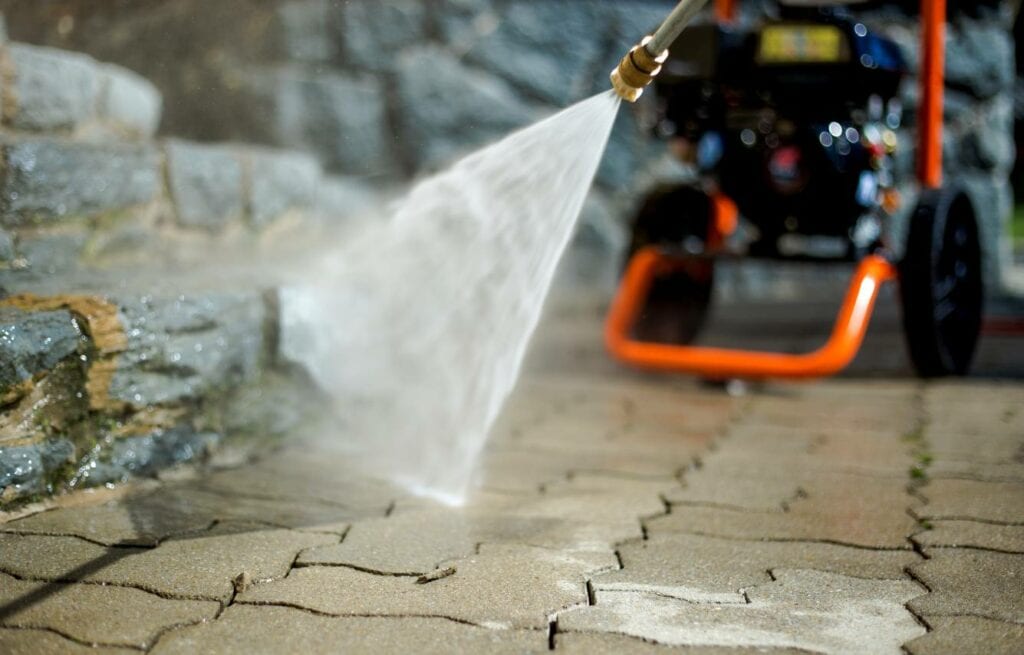
3. Water + Electricity
Pressure washers are insulated and made to be safe. Often, they’re considered safe for the average person to use. However, there is always a risk when you mix electricity with water. Therefore, consider working with an RCD or similar device to discharge any electricity the machine may dispel.
 Frequently Asked Questions
Frequently Asked Questions
Do pressure washers need a hose?
You’ll need a hose to allow your pressure washer to work properly. The machine needs a constant supply of water to work properly. Usually, this is supplied through a hose. However, you can technically feed them water through other means, though this would be more complicated. Therefore, we recommend purchasing a hose if you do not have one already and using that.
What is the difference between a power washer and a pressure washer?
A power washer heats up the water a lot. It should be practically steamy when it comes out of the power washer. However, a pressure washer doesn’t always have a heating element. If it does, this water isn’t heavily heated.
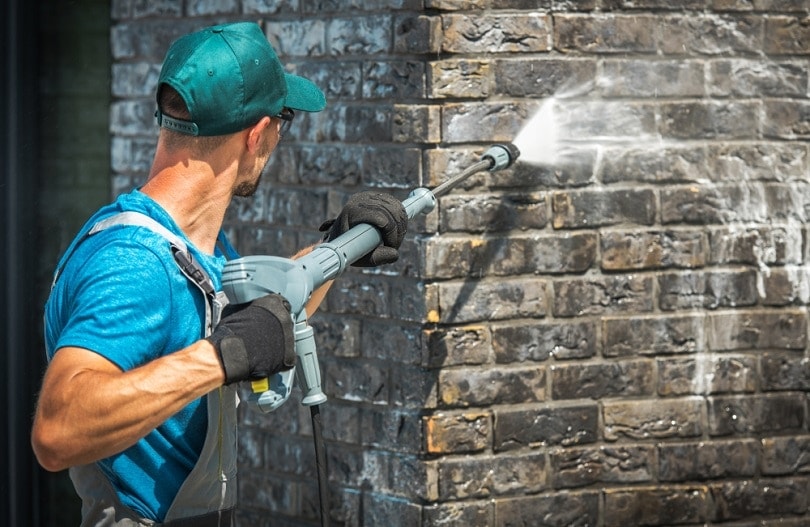
How do pressure washers connect to water?
Usually, pressure washers are designed to connect to a garden hose. This brings water into the system’s pump, allowing it to dispel at a high speed. They do not have this water built-in coming from a tank, which would require frequent refilling. However, they usually have a tank for the soapy mixture, which the machine mixes with the water that comes in.
Because this substance is mixed with water, it often needs to be more concentrated than you would usually use.
Can you use a bucket of water with a pressure washer?
Technically, yes. However, you’d need a suction hose to transfer the water from the bucket to the machine. You can also use a tank, which is often pressurized, allowing it to be used with the average hose. Of course, you will need to refill the bucket when it becomes empty. Therefore, this method usually requires a bit more work on your part.
 Conclusion
Conclusion
A pressure washer is a pretty straightforward machine. It brings in water and a cleaning mixture, mixes them together, and expels the water at a high speed. This way, it can release a lot of soapy water very quickly. For this reason, a pressure washer is often more efficient since it releases very little water at a time. The pressure of the water also helps clean away dirt and grime without any scrubbing on your part.
Featured Image Credit: Media Whalestock, Shutterstock
Contents
 How Does It Work?
How Does It Work? Disadvantages of Pressure Washers
Disadvantages of Pressure Washers